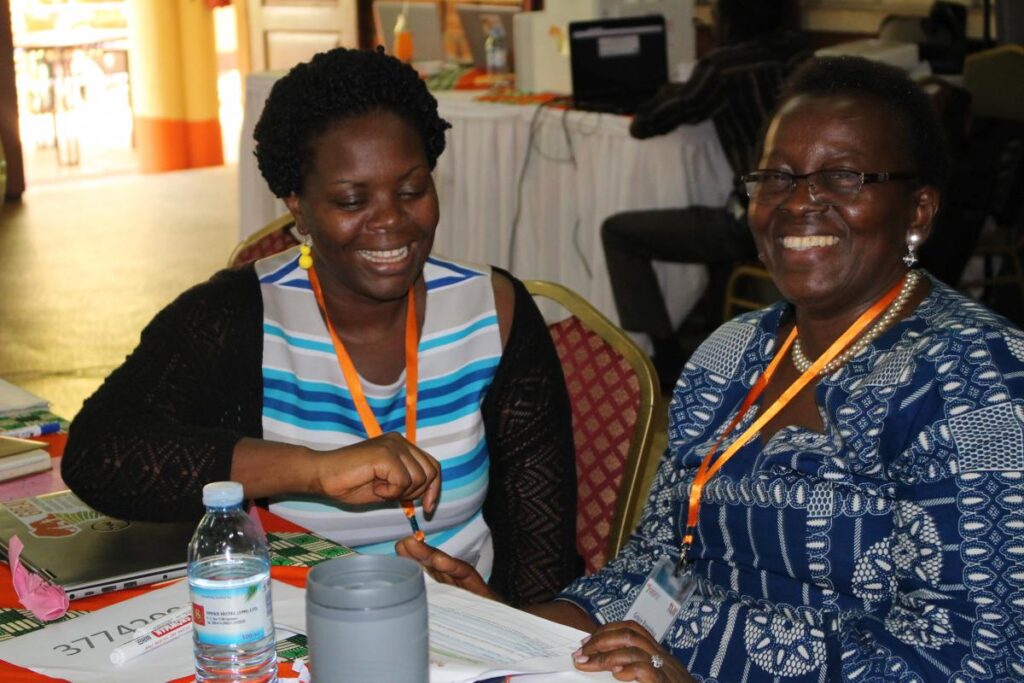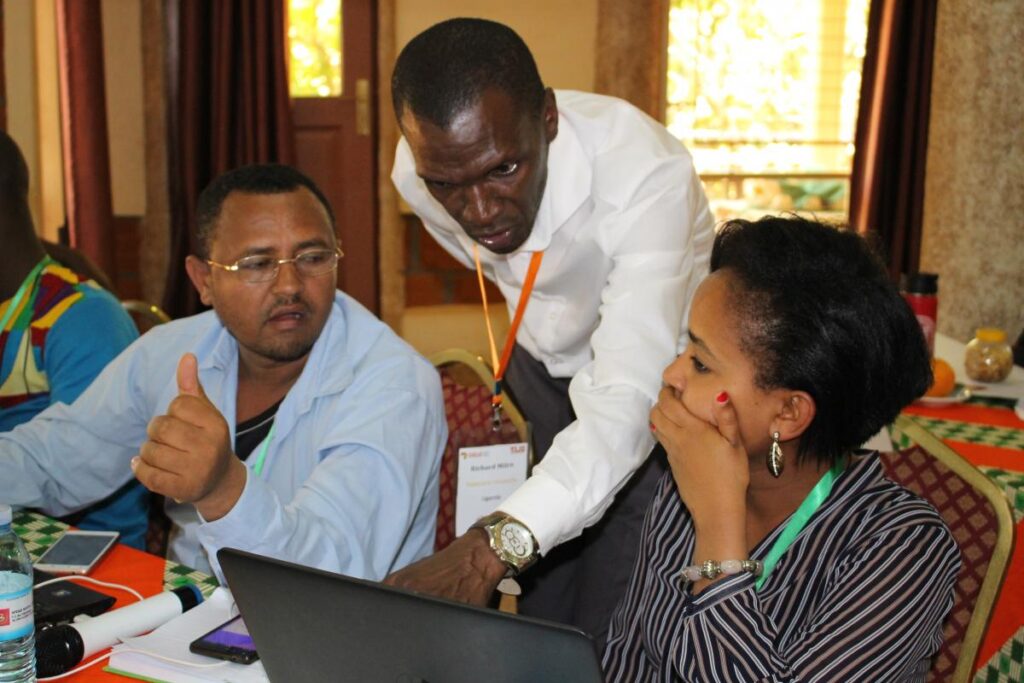By: Brenda Boonabaana, GREAT Trainer, Associate Coordinator; Richard Miiro, GREAT Trainer
Interdisciplinary work is the core of the GREAT approach. It is only through collaboration between different expertise that GREAT’s vision of inclusive and effective agricultural systems can be realized. In the following blogs, two of our trainers reflect on some insights they gained from our recently-concluded Tropical Legume III (TLIII) GREAT spinoff course.
Different minds, same conversation: Breeders and social scientists move the gender agenda forward together!
Brenda Boonabaana, GREAT Trainer, Associate Coordinator, AWARD Fellow and Lecturer, College of Agricultural and Environmental Sciences, Makerere University

GREAT trainer and project manager Brenda Boonabaana, left, with GREAT trainer Grace Bantebya, at the TLIII spinoff course in November, 2018.
The recent GREAT Tropical Legume III course tailored for ICRISAT that was held in Kampala, Uganda 26th November-1st December, 2018 generated excitement and interest among research teams of breeders and social scientists alike. The scientists learned in an interdisciplinary manner together, and committed to moving the gender agenda to another level. Teams drawn from Tanzania, Nigeria, Ethiopia, Uganda, Mali, Burkina Faso and Ghana, including programmes actively engaged in gender and breeding, generated conversations that yielded great actions, with all teams coming up with actionable breeding interventions and strategies that will eventually enhance equitable outcomes for both men and women in sub-Saharan Africa. The training provided a platform for asking complex questions and providing practical solutions such as the need to focus on gender-responsive breeding that targets the needs of all clients, and embracing the mixed methods approach to enable a holistic understanding of the gender yield gaps that the projects had identified. The importance of working in interdisciplinary teams rather than working in isolation was clearly demonstrated and appreciated by the scientists during the training.
Participants shared openly and self-critiqued their work across the design-implementation-results-intervention pathway as they searched for solutions to bridge the gender gaps in various African countries. I realized that the breeders and social scientists were equally actively engaged, willing to ask gender questions, suggest ideas and question their own biases. Exposing scientists to content on gender theory, gender-responsive plant breeding, gender-based constraints and opportunities, women’s empowerment, principles of qualitative and quantitative gender research and associated tools, and mixed methods design was very beneficial.
The key highlight was each team’s presentation on Day 6, where they self-critiqued their work, received feedback from their peers and trainers, and suggested the way forward in line with the skills and knowledge acquired. I immensely appreciated the value of bringing breeders and social scientists into one room for an applied gender course that facilitated mutual learning.
I thank the GREAT Co-PIs, Prof. Margaret Mangheni (Makerere University, Uganda) and Dr. Hale Ann Tufan (Cornell University, USA) for their visionary leadership that has enabled the GREAT team to achieve such a milestone.
Style matters: Training interdisciplinary teams for gender-responsive breeding programmes
Richard Miiro, GREAT Trainer and Senior Lecturer, College of Agricultural and Environmental Sciences, Makerere University

GREAT trainer Richard Miiro, center, with GREAT participants at the TLIII spinoff
course in November, 2018.
I have been involved as a trainer in both the main GREAT course and its first spinoff course, for the Tropical Legumes III (TLIII) project, under ICRISAT. In this TLIII spin off, I have led trainings in personal reflections on gender, mixed methods and quantitative methods. It is an international role that requires one to know the subject, principles, practices and procedures. However you also need to have a great sense of communication and facilitation skills. I have been very intentional about getting to know the participants/trainees and appreciating the differences in experience, disciplinary focus, cultural diversity and personalities that they bring to the learning situation. I have offered them my respect, faith and interest in what they are able to achieve for the societies and countries they represent stretching to Burkina Faso, Ethiopia, Ghana, Kenya, Mali, Nigeria, Tanzania and Uganda.
Having the opportunity to use my positionality and reflexivity was a great delight. The training style and attitude exhibited by a GREAT trainer matters. I have been intent on drawing on the participants’ experiences, paying attention to energy levels, adult needs and expert needs, while ensuring that each discipline appreciates, respects and supports the other. Sensitivity towards energy levels guides the GREAT training design processes. We ensure that the training is interactive, rigorous, relaxed, participatory, allows for self-discovery, self-reflection, builds empathy for clients, offers for self-adjustment and empowers participants. I have found great reward in exercising my training and facilitation skills knowing that they are key to realizing the changes that will be monitored among the participants and their societies. It is such a great honor to again impact the world through TLIII and GREAT!





